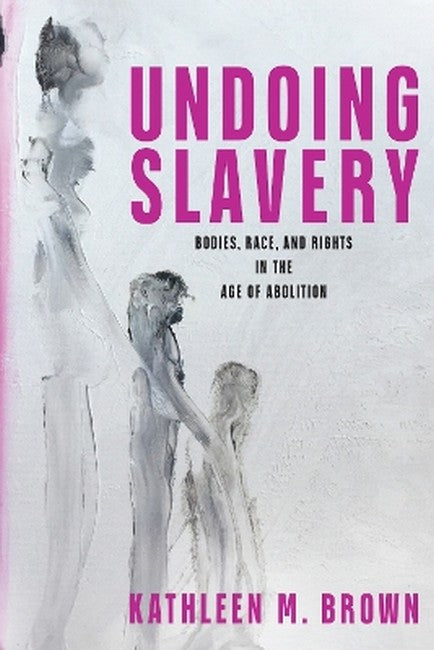Kathleen M. Brown is David Boies Professor of History at the University of Pennsylvania. She is author of the prize-winning books Foul Bodies: Cleanliness in Early America and Good Wives, Nasty Wenches, and Anxious Patriarchs: Gender, Race, and Power in Colonial Virginia.
Request Academic Copy
Please copy the ISBN for submitting review copy form
Description
"Kathleen M. Brown centers discussions on the body as an analytical category, using legal, social, and economic history to demonstrate ways that the concept of the body, or "embodied humanity," was used by abolitionists and in legal cases to undermine slavery. . . .[A]n important contribution on how abolitionists, Black and white, sought to undermine the concepts of racial science on which, by the mid-nineteenth century, proslavery proponents increasingly hinged their arguments." (Journal of Southern History) "Kathleen M. Brown takes a familiar story-the antebellum abolitionist movement-and gives it an exciting new backdrop that yields significant new insights: the shifting scientific, medical, and popular understandings of the body that occurred over the course of the nineteenth century... Undoing Slavery is an important contribution to our understanding of activism, the body, and the connections between them in the nineteenth century and to this day." (The Journal of the Civil War Era) "Brown has written a comprehensive social, legal, economic, and medical history of the age of abolition, based on an extraordinary number of primary and secondary sources. This well-documented, readable, and multifaceted book aims to revisit the well-known fight against slavery and racism in the United States through the lens of the concept of 'embodied self-sovereignty.'" (International Review of Social History) "Undoing Slavery offers a powerful, sophisticated, and timely re-examination of the American antislavery struggle that focuses on the central importance of both bodily emancipation and embodied freedom. Brimming with insights on gender, medicine, race, rights, and the ultimate meaning of human liberation, Kathleen M. Brown's book is one of the most innovative treatments of abolitionism in years. Yet it also provides lessons for our own time, when new generations of scholars and citizens look to the past to better understand the fundamental link between human rights and bodily freedom. Simply a must-read book by one of our most creative and thought-provoking historians." (Richard Newman, author of Freedom's Prophet: Bishop Richard Allen, the AME Church, and the Black Founding Fathers) "Undoing Slavery will undo what you thought you knew about abolitionist campaigns. Combining a dazzling array of primary sources with insights gleaned from legal, medical, and gender studies, Kathleen M. Brown brilliantly upends the seemingly incontrovertible argument that abolition resulted from a discourse empowered by the Enlightenment and instead shows how concerns about the corporeal body framed the ways in which abolitionists developed their arguments to end slavery and led them to insist on bodily care as the urgent rationale for abolition. This is a truly original account of the people we all thought we knew and the conversations we all thought they had." (Jim Downs, author of Maladies of Empire: How Colonialism, Slavery, and War Transformed Medicine) "Undoing Slavery arrives at the perfect moment for all who need to understand what's at stake in the current battles over reproductive rights. An expert on law, race, gender, and sexuality in early America, Kathleen M. Brown shows how antislavery activists, especially Black women abolitionists, put bodies at the center of the fight to undo slavery. Ultimately, ending slavery was as much about Black women reclaiming control over their bodies and their reproductive freedom as it was about electoral politics or human rights discourse. Deftly moving among medicine, law, religion, and economics, Brown delivers a brilliant, necessary history for our time." (Ariela Gross, author of Becoming Free, Becoming Black: Race, Freedom, and Law in Cuba, Virginia, and Louisiana) ""Undoing Slavery is an important book that will long shape conversations about abolitionism, the history of early American medicine, and African-American intellectual history."-Journal of Social History" (Journal of Social History)

